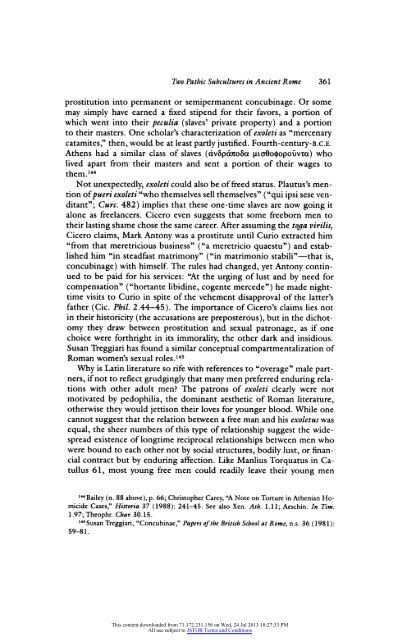Two Pathic Subcultures in Ancient Rome
Two Pathic Subcultures in Ancient Rome
Two Pathic Subcultures in Ancient Rome
You also want an ePaper? Increase the reach of your titles
YUMPU automatically turns print PDFs into web optimized ePapers that Google loves.
<strong>Two</strong> <strong>Pathic</strong> <strong>Subcultures</strong> <strong>in</strong> <strong>Ancient</strong> <strong>Rome</strong> 361<br />
prostitution <strong>in</strong>to permanent or semipermanent concub<strong>in</strong>age. Or some<br />
may simply have earned a fixed stipend for their favors, a portion of<br />
which went <strong>in</strong>to their peculia (slaves' private property) and a portion<br />
to their masters. One scholar's characterization of exoleti as "mercenary<br />
catamites," then, would be at least partly justified. Fourth-century-B.C.E.<br />
Athens had a similar class of slaves (v8paito8a ta0o0oopoivta) who<br />
lived apart from their masters and sent a portion of their wages to<br />
them. 144<br />
Not unexpectedly, exoleti could also be of freed status. Plautus's mention<br />
of pueri exoleti "who themselves sell themselves" ("qui ipsi sese venditant";<br />
Curc. 482) implies that these one-time slaves are now go<strong>in</strong>g it<br />
alone as freelancers. Cicero even suggests that some freeborn men to<br />
their last<strong>in</strong>g shame chose the same career. After assum<strong>in</strong>g the toga virilis,<br />
Cicero claims, Mark Antony was a prostitute until Curio extracted him<br />
"from that meretricious bus<strong>in</strong>ess" ("a meretricio quaestu") and established<br />
him "<strong>in</strong> steadfast matrimony" ("<strong>in</strong> matrimonio stabili"-that is,<br />
concub<strong>in</strong>age) with himself. The rules had changed, yet Antony cont<strong>in</strong>ued<br />
to be paid for his services: "At the urg<strong>in</strong>g of lust and by need for<br />
compensation" ("hortante libid<strong>in</strong>e, cogente mercede") he made nighttime<br />
visits to Curio <strong>in</strong> spite of the vehement disapproval of the latter's<br />
father (Cic. Phil. 2.44-45). The importance of Cicero's claims lies not<br />
<strong>in</strong> their historicity (the accusations are preposterous), but <strong>in</strong> the dichotomy<br />
they draw between prostitution and sexual patronage, as if one<br />
choice were forthright <strong>in</strong> its immorality, the other dark and <strong>in</strong>sidious.<br />
Susan Treggiari has found a similar conceptual compartmentalization of<br />
Roman women's sexual roles.'45<br />
Why is Lat<strong>in</strong> literature so rife with references to "overage" male partners,<br />
if not to reflect grudg<strong>in</strong>gly that many men preferred endur<strong>in</strong>g relations<br />
with other adult men? The patrons of exoleti clearly were not<br />
motivated by pedophilia, the dom<strong>in</strong>ant aesthetic of Roman literature,<br />
otherwise they would jettison their loves for younger blood. While one<br />
cannot suggest that the relation between a free man and his exoletus was<br />
equal, the sheer numbers of this type of relationship suggest the widespread<br />
existence of longtime reciprocal relationships between men who<br />
were bound to each other not by social structures, bodily lust, or f<strong>in</strong>ancial<br />
contract but by endur<strong>in</strong>g affection. Like Manlius Torquatus <strong>in</strong> Catullus<br />
61, most young free men could readily leave their young men<br />
144<br />
Bailey (n. 88 above), p. 66; Christopher Carey, "A Note on Torture <strong>in</strong> Athenian Homicide<br />
Cases," Historia 37 (1988): 241-45. See also Xen. Ath. 1.11; Aesch<strong>in</strong>. In Tim.<br />
1.97; Theophr. Char. 30.15.<br />
145 Susan Treggiari, "Concub<strong>in</strong>ae," Papers of the British School at <strong>Rome</strong>, n.s. 36 (1981):<br />
59-81.<br />
This content downloaded from 71.172.231.156 on Wed, 24 Jul 2013 18:27:33 PM<br />
All use subject to JSTOR Terms and Conditions
















